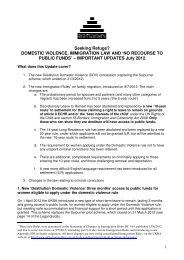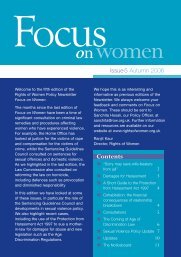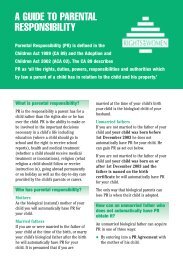Seeking Refuge? - Rights of Women
Seeking Refuge? - Rights of Women
Seeking Refuge? - Rights of Women
Create successful ePaper yourself
Turn your PDF publications into a flip-book with our unique Google optimized e-Paper software.
If the Immigration Judge decides that you are not<br />
entitled to protection in the UK, your appeal<br />
against the UK Border Agency’s initial decision will<br />
be dismissed. It is important to get legal advice as<br />
soon as you are refused protection, as it may be<br />
possible to challenge this decision.<br />
Appeals against a decision<br />
made by the Asylum and<br />
Immigration Tribunal<br />
It may be possible to appeal against, or challenge<br />
the decision <strong>of</strong> an Immigration Judge. However,<br />
this can only be done in certain circumstances,<br />
such as if the Immigration Judge made an error<br />
<strong>of</strong> law (a mistake about the law and how it<br />
should be applied in your case).<br />
If the Immigration Judge has made an error <strong>of</strong><br />
law, then your case can be reconsidered.<br />
Reconsideration involves having a new hearing<br />
about your case and why you should be given<br />
protection in the UK, before a different<br />
Immigration Judge(s) in the AIT.<br />
There are also circumstances where it may be<br />
possible to appeal a decision to the Court <strong>of</strong><br />
Appeal, or The Supreme Court.<br />
The law on appealing determinations is complex.<br />
If you are considering appealing a determination<br />
you should seek legal advice from your legal<br />
representative, or one <strong>of</strong> the organisations listed<br />
below.<br />
If you are unable to appeal against a decision to<br />
refuse you protection to any other court, you have<br />
exhausted (finished) your rights to appeal and you<br />
become removable. For information about<br />
removal, see Chapter 9.<br />
Transfer <strong>of</strong> the Asylum and<br />
Immigration Tribunal<br />
The Government makes decisions in a number <strong>of</strong><br />
different areas <strong>of</strong> law that individuals may want to<br />
appeal against. For example, a person who has<br />
been refused welfare benefits or criminal injuries<br />
compensation may want to appeal against that<br />
decision to someone independent. If they do,<br />
then the place that they can appeal to is the Firsttier<br />
Tribunal. A tribunal is a type <strong>of</strong> court. The<br />
main function <strong>of</strong> the First-tier Tribunal is to hear<br />
appeals against decisions taken by the<br />
Government in certain areas <strong>of</strong> law, including<br />
welfare benefits, criminal injuries compensation<br />
and asylum support law.<br />
In 2009, the Government decided to transfer the<br />
Asylum and Immigration Tribunal into the Tribunal<br />
structure, so that it sits alongside the other<br />
Tribunals. It is expected that this transfer will<br />
happen sometime in 2010. This will mean that<br />
sometime in 2010, appeals against decisions<br />
taken by case-owners in the UK Border Agency<br />
will be heard in the First-tier Tribunal.<br />
The First-tier Tribunal is independent <strong>of</strong> the<br />
Home Office and decisions in the tribunal will be<br />
taken by judges. The rights <strong>of</strong> those who are<br />
appealing against a decision taken by their caseowner<br />
in the UK Border Agency will not be<br />
affected by this change. However, the procedure<br />
for applying for a reconsideration <strong>of</strong> a<br />
determination will change, as an application for<br />
an order for reconsideration will be made first to<br />
the First-tier Tribunal and, if they refuse, to the<br />
Upper Tribunal (rather than the Administrative<br />
Court, as is the case now). The process for<br />
judicially reviewing some types <strong>of</strong> decisions may<br />
also be changed by the transfer <strong>of</strong> the AIT.<br />
The law on appealing determinations is complex.<br />
If you are considering appealing a determination<br />
and you want to know more about whether or<br />
not these changes affect you, you should seek<br />
legal advice from your legal representative, or one<br />
<strong>of</strong> the organisations listed below.<br />
For more information about the First-tier<br />
Tribunal and the types <strong>of</strong> decisions that<br />
can be appealed against, visit:<br />
www.tribunals.gov.uk<br />
Things to remember<br />
• A claim for asylum or some other form <strong>of</strong><br />
protection in the UK is decided initially by a<br />
case-owner in the UK Border Agency. You<br />
may be able to appeal against a decision to<br />
refuse you protection, or to give you a form <strong>of</strong><br />
protection that is different to what you applied<br />
for, to the Asylum and Immigration Tribunal<br />
(the AIT).<br />
• Appealing against the decision <strong>of</strong> the UK<br />
Border Agency to the AIT is complicated, as is<br />
appealing against the decision <strong>of</strong> the AIT. It is<br />
therefore important that throughout these<br />
processes, you seek legal advice. If you do not<br />
have a legal representative, you should contact<br />
one <strong>of</strong> the support organisations listed below<br />
for advice.<br />
54
















